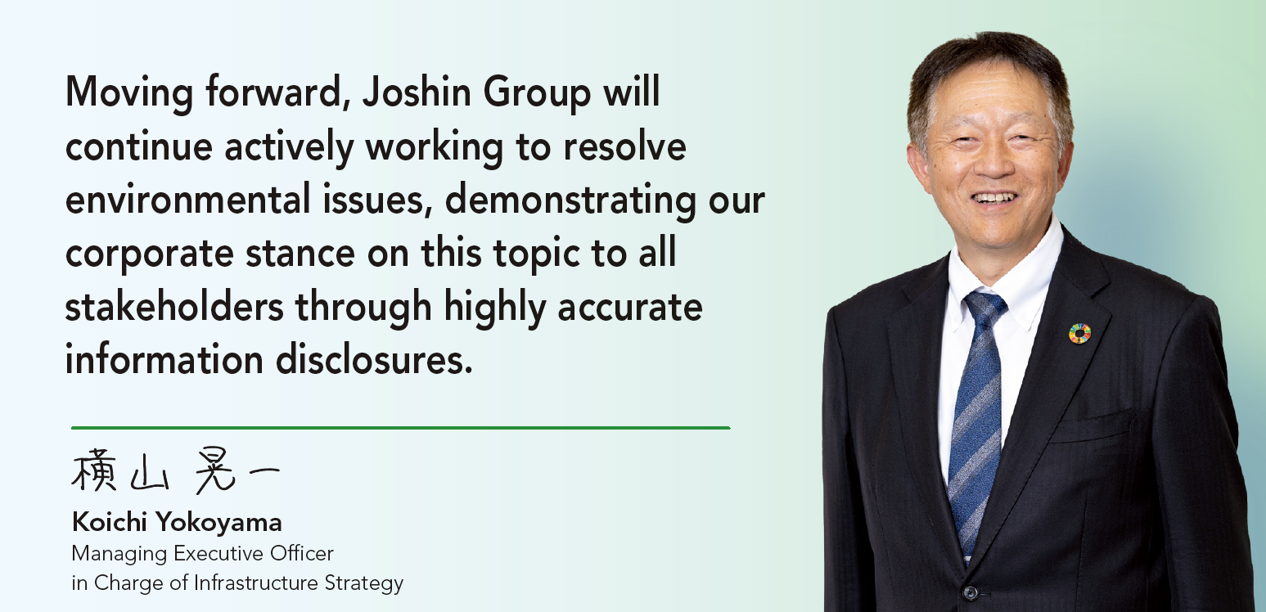
- As an industry leader of environmental initiatives, the Joshin Group recognizes that people’s growing concern for the environment and the transition to a “decarbonized” society of the future represent major business opportunities for the Group. To that end, we believe that generating social value by “achieving household carbon neutrality” will in turn enhance our corporate value.
- Joshin will continue to promote the replacement of household goods with environmentally friendly ones that contribute to making households carbon neutral, in addition to selling residential solar power systems, home renovation services, and EV-related products that have become an important pillar of our earnings in the home appliances business, and we will further strengthen these initiatives moving forward. Specifically, we are promoting more widespread use of energy-efficient products such air conditioners, refrigerators, drum-type washer-dryers, and instant-heating warm-water washing toilet seats, as well as high-performance energy generation, storage, and efficiency products such as Eco Cute heat pump water heaters, energysaving gas water heaters, bathroom renovations (saving energy with high-insulation bathtubs), water-saving toilets, solar power systems, and home storage batteries. Additionally, with the growing adoption of EVs, we expect demand for residential EV charging equipment to continue rising. The Joshin Group has long offered EV outletinstallation services to promote the introduction of EV charging systems, and since FY2022, we have also begun full-scale sales and installation of V2H (Vehicle to Home) systems. We believe that determinedly implementing these initiatives now will give rise to opportunities to participate in new environmental businesses in the future.
Meanwhile, the loss of biodiversity has come into sharp focus as a global issue. The Joshin Group has positioned preservation of biodiversity as a material issue to be resolved, and it is incorporated into the Joshin Group Basic Environmental Policy and the Joshin Group Procurement Policy and Procurement Guidelines. These documents emphasize biodiversity conservation and accommodations aimed at achieving a sustainable natural environment.
Moreover, beginning in FY2024, the Joshin Group has been working to determine our relationship with natural resources and dependence on and impact on nature from our perspective as a retailer. As part of our first disclosure under the TNFD (Taskforce on Nature-related Financial Disclosures) declaration, we published a qualitative analysis based on TNFD recommendations. Going forward, we will further enhance our analysis of risks and opportunities related to our directly managed sites and broaden our information disclosures.
Finally, the biggest news for FY2024 with respect to the Joshin Group’s environmental initiatives was our acquiring an A score, the highest CDP rating, for the second consecutive year under the CDP Climate Change Program. We also received the highest rating of “AAA” for the first time in the MSCI ESG Ratings, a globally recognized benchmark for ESG investment.
We believe that this shows how the Group’s initiatives to tackle environmental problems and promote information disclosure have been highly evaluated internationally. While it is also an issue that we are presently working on, we intend to convincingly communicate our “Environmental Joshin” aspect to our customers as an integral part of our brand to ensure that it makes a large contribution to the Group’s business.
Moving forward, Joshin will continue actively working to resolve environmental issues, demonstrating our corporate stance on this topic to all stakeholders through involvement in international initiatives and appropriate information disclosures, and thereby boosting our company image and corporate value.
.jpg)
